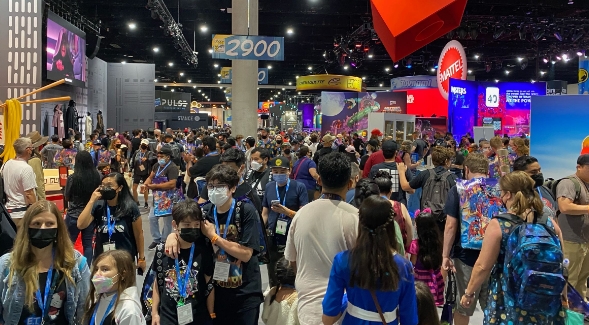SDSUxComic-Con: Faculty Bring Diverse Voices into Panels
SDSU participants will dive into such subjects as Afro-futurism, social justice, identity, horror, and Harry Potter.

It’s been a rough ride for Comic-Con International during the COVID-19 era, but this year’s in-person festival brings at least nine San Diego State University faculty members and one student to the San Diego Convention to share their research and expertise on diverse topics.
Here is a look at some of the Comic-Con 2022 panels with an SDSU connection:
“Afro-Futurism–Black to the Future V: No Jive–Talk Black to Me! (The TED Talk),” 11:30 a.m.–12:30 p.m., Thursday, July 21, Room 24ABC
Ajani Brown, lecturer in Africana Studies, and Sureshi Jayawardene, Africana Studies associate professor and associate director of the Digital Humanities initiative, will join in the discussion about emerging technologies and discoveries that uniquely impact the Pan-African diaspora.
The panel consists of six African American women who are STEM professionals, representing space, medical, technology and education fields. Guest of honor, Dr. Yvonne Cagle, is one of six black women to become NASA astronauts. “Each guest will provide insight into their career path, the politics of the digital divide and the need to promote STEM fields to young people of color,” Brown said.
“Real or Fake Gameshow,” 7–8 p.m., Thursday, July 21, Room: Grand 10 & 11, Marriott Marquis San Diego Marina
Student Fawaz Qashat, president of the SDSU Comics Studies Club, will participate in a panel where contestants try to separate real comics plots from the fakes.
“Are We Wizards? The Harry Potter Fandom in 2022,” 7:30–8:30 p.m., Thursday, July 21, Room 29CD. Additional information here.
“Raising the Dead: Horror Comics and the Comics Code,” 1–2 p.m., Friday, July 22, Room 11
Co-directors of the SDSU Center for Comics Studies Pamela Jackson, popular culture librarian and Beth Pollard, history professor, will join Jordan Smith of the Comic Book Legal Defense Fund to discuss issues about why people are drawn to the horror genre, how and why the genre rose in popularity after World War II and into the 1950s (steeped in Cold War and why horror comics were targeted by the Comics Code Authority for censorship and restriction.
“It is my hope to also discuss parallels between progressive social change in the United States and spiking censorship, which is something we saw happen in the 1950s and I would argue we are very much seeing again now,” Jackson said.
“The Transformational Power of a Comics and Social Justice Curriculum,” 10:30–11:30 a.m., Saturday, July 23, Room 26AB
Pollard and Jackson will be joined by Jess Whatcott, professor of women’s studies, and Gregory A. Daddis, professor of history and director of the Center for War and Society. Faculty from the Center for Comics Studies will highlight curriculum topics that include comics and race, LGBTQ+, visual rhetoric, religion, Chicanx, manga, comics for K-12 teachers, and the politics of representation. These include Daddis’s upcoming fall course, “Comics and Cold War America,” which encourages students to think deeply about some of the core principles of social justice: equality, equity, rights, and participation.
Pollard will share the process of comics curriculum design at SDSU, and Jackson will focus on how the SDSU Comic Arts Collection at the library supports the growing curriculum.
“Comics, History and Identity,” 11:30 a.m.–1 p.m., Saturday, July 23, Room 26AB
Desmond Hassing, a lecturer in American Indian Studies who has attended Comic-Con for at least 28 years, will discuss features of the comic book art and writing of the Golden Age that reinforce ideas about Western identity.
In his presentation, “Blood in the Margins, The Indian Hiding in the In-Between Space: The American Western Identity Transmitted Through Peritexts,” Hassing will share an exploration of how comic book artists and writers in the Golden Age of comics used comic strips, learning activity sheets, decoding exercises, information sheets and other features to guarantee their mail shipping rate while reinforcing ideas about identity.
“Express Yourself: Activism Through the Comic Arts,” 1–2 p.m., Saturday, July 23, Room 11
Pollard and Jackson join other panelists to explore how comics can address social and political issues and how people can use comics to exercise their right to free expression.
“How Science Fiction Has Influenced STEAM,” 1–2 p.m., Saturday, July 23, Helen Price Reading Room, San Diego Central Library
John Putman, associate dean of the College of Arts and Letters, professor of history and “Star Trek” expert will examine how science fiction literature and TV/film have influenced the growth of STEAM education. “I will talk about how many NASA engineers, astronauts, and other scientists explain that ‘Star Trek’ inspired them to seek their careers,” Putnam said. “We know that ‘Star Trek’ communicators used in ‘The Original Series’ inspired cell phone technology and the famous replicators led some to imagine 3-D printing. I plan to also talk about how Star Trek has also directly and indirectly encouraged ideas of philosophy, history, and literature.”
The complete programming schedule can be found here.



